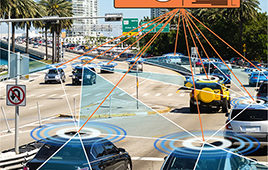Feature: Internet power may need computers to sleep
By David Adams

internet activities is roughly the same as
the airline industry.
Image: fotosipsak/iStockphoto
On any given day the amount of energy used to power Facebook pages, recipe searches, news sites and all that the internet entails is about 20 or 30 gigawatts – in terms of greenhouse gas emissions, this is roughly the same as the airline industry.
That equates to two or three times as much as Victoria’s total peak electricity generating capacity and although it only accounts for two or three per cent of the energy consumed around the world, the rate at which the internet is growing means this figure is starting to climb – and fast.
Dr Lachlan Andrew, associate professor at the Centre for Advanced Internet Architectures (CAIA) at Swinburne University of Technology, is researching ways in which the efficiency of the internet can be improved to lessen its environmental impact.
He is motivated not only by the influence the internet’s power use is already having on the environment but also by the finite nature of the world’s energy supply.
“The total rate of extraction of oil is approaching its peak and the total rate of energy generation will also reduce,” says Dr Andrew, who joined Swinburne in 2008 after spending three years at the California Institute of Technology (Caltech) in the US. “The current mindset of ‘x’ per cent growth per annum will have to change. We simply can’t keep increasing our activity because the rate at which we use one of our most basic raw materials (oil) is going to have to decline.”
Drawing on funding he will receive over the next four years after being awarded an Australian Research Council Future Fellowship, Dr Andrew is proposing a number of projects to investigate ways in which the internet’s energy efficiency can be increased and what effects this has on its performance.
One of the projects already underway is looking at how a computer’s processing speed can be better regulated to minimise energy consumption.
Computers can already slow down the rate at which they process information to save energy, but it is generally only done in an ad-hoc fashion, according to parameters set by the manufacturer. Together with Caltech’s Dr Adam Wierman, Dr Andrew is examining how the mechanism within a computer responsible for controlling processing speed can be manipulated to make PCs’ energy use more efficient, while holding the time a computer takes to complete a job within reasonable limits.
Dr Andrew says the point of the research is not necessarily to encourage more people to adopt the most energy-efficient way of processing but to make them more aware of the trade-offs that are involved.
“We’re saying ‘Here’s the trade-off: if you want to be putting a lot of emphasis on going fast, then you will save this much less energy; if you want to put the emphasis on saving energy, then you will run this much slower’. So we’re quantifying the trade-offs for the designers.”
Other projects include one in which Dr Andrew and his Swinburne colleague, Associate Professor Hai Vu are looking at how components of some switches located within routers used to provide internet connectivity can be shut down at certain periods to save energy.
In a separate initiative, Dr Andrew is also proposing to examine how putting computers used in commercial peer-to-peer file sharing networks into a ‘sleep state’ for a period of time will affect energy consumption and the network’s performance.
Dr Kerry Hinton, a senior research fellow at the Institute for a Broadband-Enabled Society (IBES) at the University of Melbourne, says Dr Andrew’s research is particularly needed given the looming ‘energy bottleneck’ – a term used to describe the problems many industry experts foresee developing as the amount of power the internet needs to function continues to grow.
“It is essential that the internet and the equipment it relies upon continuously become more energy efficient,” he says. “Without this, the internet’s growth will ultimately result in an energy bottleneck. If this is not resolved, future growth of the internet may be retarded. This could negatively impact on social and economic developments that rely on the internet.”
Dr Hinton says one of the most important aspects of the work surrounds working out how to use computer ‘sleep states’ to reduce energy consumption.
“Get it right and we can make good gains in energy efficiency. Get it wrong and the energy consumption may actually increase.”
Dr Mung Chiang, an associate professor of electrical engineering at Princeton University in the US and someone aware of Dr Andrew’s work, says that working out how to trade-off technology performance with energy consumption is a demanding challenge to researchers globally.
“I believe Lachlan’s research work and collaborations present one of the most promising efforts to meet that challenge,” he says, noting that it will complement work being done elsewhere around the world – in Asia, the US and the European Union – to ‘green’ the IT industry. “Lachlan’s research program on this topic will naturally form partnerships with some of these.”




